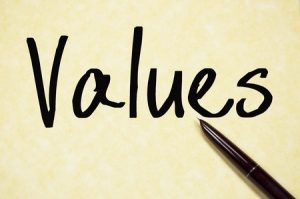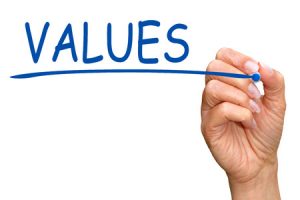What Do Values Really Mean?
It’s not uncommon to hear leaders talk about values, but never define them. The importance of values is regularly espoused in politics and religion, and of course in business. Yet few will actually identify and define the values they claim to hold so high.
“We need to preserve our values.”
“Our values will guide this business forward.”
What specific values are they talking about? And specifically, what do they mean?
 If you ask someone to list some values, good chance they’ll reference terms like Integrity, Honesty, and Trust. But then they’ll appear stumped to name any more. Then ask them to explain what Integrity means, and their response will likely sound like the student trying to make up an answer to an exam question on a topic they never studied.
If you ask someone to list some values, good chance they’ll reference terms like Integrity, Honesty, and Trust. But then they’ll appear stumped to name any more. Then ask them to explain what Integrity means, and their response will likely sound like the student trying to make up an answer to an exam question on a topic they never studied.
Values can be a nebulous concept.
Defining values is like trying to define quality of life.
The Meaning of Values
The first thing we need to acknowledge is that values are personal. Only YOU can determine the value of anything – and everything – in your life. No one else.
Simply stated:
Value means worth.
Consider a simple example. Think about a specific vehicle you admire (new or used), and ask these two questions:
- What is its value?
- What is it worth?
Both questions address the same thing – a monetary amount you associate with this vehicle. The meaning of both value and worth rests within you. The question of price is irrelevant. You determine if the car’s price is high or low compared to how valuable you perceive it to be.
The same holds true for living things, such as a pet dog. You might consider your dog to be priceless and would do anything to protect it. Yet, someone else might not stop to help if a car hit your dog. You clearly value your dog while others may not.
Each of us as individuals determines the worth – or value – of every person, place, or thing in our world. You alone decide whether an idea or concept, or your personal feelings, emotions or experiences have value, and if so, how much.
Of course, it is possible to be influenced by outside factors, such as the opinions of others, third party assessments, and even a simple price tag placed on an item you admire. But only you can determine what is worthwhile and desirable, and what is not.
The second thing we need to recognize is that values are rank ordered. In fact, if you could rank order everything in your life that you value, there would be some common trends. Hopefully you value people more than things. Maybe you value the closeness of family over your desire to explore the world. Or maybe you value saving money over owning the highest quality.
The truth is it can be extremely beneficial to discover the top few values in your life. This helps you prioritize and focus on what is most important.
This also holds true in business.
If you rank ordered everything a company values, maybe quality would be valued over creativity. Or maybe safety matters more than achieving results.
Whatever business leaders determine the top values may be, knowing what they are helps everyone prioritize and focus on what is most worthwhile.









